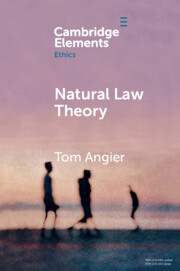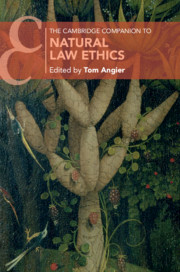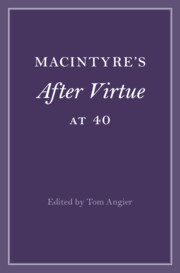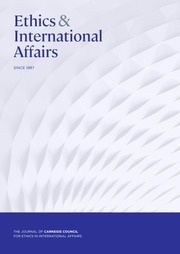Natural Law Theory
Part of Elements in Ethics
- Author: Tom Angier, University of Cape Town
- Date Published: August 2021
- availability: This ISBN is for an eBook version which is distributed on our behalf by a third party.
- format: Adobe eBook Reader
- isbn: 9781108600354
Find out more about Cambridge eBooks
Adobe eBook Reader
Other available formats:
Paperback
Looking for an inspection copy?
This title is not currently available for inspection. However, if you are interested in the title for your course we can consider offering an inspection copy. To register your interest please contact [email protected] providing details of the course you are teaching.
-
In Section 1, I outline the history of natural law theory, covering Plato, Aristotle, the Stoics and Aquinas. In Section 2, I explore two alternative traditions of natural law, and explain why these constitute rivals to the Aristotelian tradition. In Section 3, I go on to elaborate a via negativa along which natural law norms can be discovered. On this basis, I unpack what I call three 'experiments in being', each of which illustrates the cogency of this method. In Section 4, I investigate and rebut two seminal challenges to natural law methodology, namely, the fact/value distinction in metaethics and Darwinian evolutionary biology. In Section 5, I then outline and criticise the 'new' natural law theory, which is an attempt to revise natural law thought in light of the two challenges above. I conclude, in Section 6, with a summary and some reflections on the prospects for natural law theory.
Reviews & endorsements
'In this admirably crisp and clear-headed essay, Tom Angier deftly charts a path forward for a form of natural law theory that reclaims species essences and natural teleology, issuing a bold challenge to reductive empiricist naturalisms. Keeping the normative grounded in the natural remains a live option, and one compatible with evolutionary biology. Highly recommended reading for natural law's defenders and detractors alike!' Jennifer A. Herdt, Gilbert L. Stark Professor of Christian Ethics, Yale Divinity School
See more reviews'In this extremely helpful and enlightening introduction to the natural law tradition in ethics, Angier explains clearly how the tradition developed, sets out its key claims, and defends it against some central criticisms - while also showing how the so-called 'new' natural law theory has gone wrong. As a result, he makes a very useful contribution to the current revival of interest in this key way of understanding the relation between nature, value, and norms.' Robert Stern, University of Sheffield, UK
'This work, while admirably concise, is extremely rich. It is both cautious and bold – cautious in its rigor and attention to careful argument, and bold in its claims. Its overall aim is to rehabilitate traditional natural law theory, especially in ethics, by countering the main challenges and alternatives to it. Angier wants to overcome the 'metaphysicophobia' of Anglophone ethics and point a way forward to reclaiming a tradition committed to essences, teleology, natural normativity, and human flourishing based on human ends. His arguments are sure to be controversial and will provoke strong reactions in his readers. But he succeeds in persuading them to take a fresh look at an ancient tradition.' Alan Mittleman, Professor of Jewish Philosophy, The Jewish Theological Seminary
Customer reviews
Not yet reviewed
Be the first to review
Review was not posted due to profanity
×Product details
- Date Published: August 2021
- format: Adobe eBook Reader
- isbn: 9781108600354
- availability: This ISBN is for an eBook version which is distributed on our behalf by a third party.
Table of Contents
1. Historical Introduction
2. 'Natural Law' – Other Idioms
3. Some Experiments in Being
4. Two Core Challenges
5. 'New' Natural Law
6. Prospective Conclusion.
Sorry, this resource is locked
Please register or sign in to request access. If you are having problems accessing these resources please email [email protected]
Register Sign in» Proceed
You are now leaving the Cambridge University Press website. Your eBook purchase and download will be completed by our partner www.ebooks.com. Please see the permission section of the www.ebooks.com catalogue page for details of the print & copy limits on our eBooks.
Continue ×Are you sure you want to delete your account?
This cannot be undone.
Thank you for your feedback which will help us improve our service.
If you requested a response, we will make sure to get back to you shortly.
×



